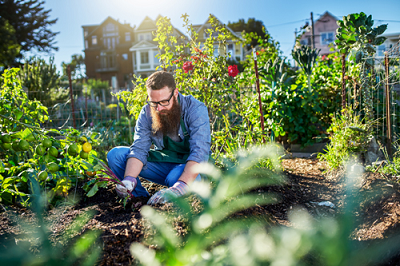National Gardening Exercise Day: 5 Reasons to Spend More Time in Your Garden
By Melody Foster
Whether you’ve got a green thumb or not, spending time in your garden can give a boost to your physical and mental health. Every year on June 6, gardeners everywhere celebrate National Gardening Exercise Day, and there are plenty of reasons gardening should be celebrated as a form of exercise.
Heavy yard work, such as moving rocks or hauling dirt can burn up to 400-600 calories per hour. Raking and bagging leaves burns about 350-400 calories per hour, and mowing (with a push mower) burns 250-350 calories per hour. Pulling weeds and planting flowers in your garden burns calories at a rate of about 200-400 per hour.
Why pay someone to do your yard work when you can save money and reap the health benefits yourself? It’s not just about burning calories; there are many other health benefits of gardening. Here are some of the benefits of gardening and yard work:
Reduce Stress — Research shows that gardening can help improve your mood and reduce cortisol levels (the stress hormone). Lower cortisol means better immune function, reduced chance of obesity, improved memory, and reduced risk of heart disease and stroke.
Improve heart health and reduce stroke risk — One study found that regular gardening reduces risk of heart attack and stroke by as much as 30 percent in adults over 60. Getting a few minutes of sun exposure increases vitamin D in the body, which has also been shown to reduce risks of heart disease, osteoporosis, and some cancers.
Increase strength and dexterity — Hand dexterity and strength naturally diminishes with age. Gardening is one way to keep your hands and fingers strong and nimble. For this same reason, gardening is often used as a form of rehabilitation for stroke patients. Be sure to use proper ergonomics to prevent tendonitis and carpal tunnel.
Lower risk of Alzheimer’s — A long-term study of nearly 3,000 adults over 16 years found that daily gardening reduced incidence of dementia by 36 percent. Another study found that gardening could reduce risk of dementia by as much as 47 percent.
Reduce depression and improve mental health — In the field of “horticultural therapy,” working outdoors has proven benefits for helping patients with mental illnesses. The benefits are likely due to the physical activity, mental stimulation, and the sense of accomplishment and satisfaction that comes with watching a garden grow.
Other health benefits of gardening include: increased flexibility, stronger joints, decreased blood pressure and cholesterol levels, lower risk of diabetes, and slowed progression of osteoporosis.
To reap the most benefit from gardening, spend at least 30 minutes working in your garden most days of the week. If you need to, break that time up into two 15-minute segments or three 10-minute segments. Put some elbow grease into your gardening, because your exercise must be at least moderate intensity to be effective. Digging holes and weeding can burn 150 calories per hour or more, while planting burns about 130 calories per hour.
When you’re working in the garden, be sure to drink plenty of water to stay hydrated, apply sunscreen, and lift using your legs to avoid injury. If you experience any pain during gardening or any other exercise, do not continue.
About the Author
Melody Foster is a Dallas-based freelance writer and contributing author to the Nicholson Clinic blog. Melody researches and creates content for clients in industries ranging from health care, fitness and nutrition to interior decorating, legal and social good.


